The view from Brooklyn, where Walt lived.
Gypsy Rose Lee and the February House, long gone.
Truman C above.
The Ditchdigger at Truman's old home in 70 Willow,
where Capote wrote Breakfast at Tiffany's.
Auden and Wolfe on Montague Terrace, David Wojnarowicz Rimbaud in New York 1978-79,
@mothtreee reminds us ... Emma G was the most dangerous woman in the World... — in New York, New York.
We wound our way to Barely Disfigured,
Where the bar feels like its shining,
This is not a brothel.
There are no prostitutes at this address.
A dead body down the hall.
Or so it seemed that Halloween night.
Friends dropping by.
Mary and Trinity and Leslie and Will.
Whose on queue for Keith and Jeremy?
You are.
Our bike careened up Smith,
over the Manhattan Bridge and back down.
Into the morass.
To the House of Yes.
WYLD THINGS: Halloween Parade Afterparty
“Stray from the flock,
Run with the beasts,
Dance like no one is lurking.
After the NYC Halloween Parade,
Let your inner animal out... Halloween Night!”
Run with the beasts,
Dance like no one is lurking.
After the NYC Halloween Parade,
Let your inner animal out... Halloween Night!”
The bike barely held us.
Navigating between the cars and cluster of Manhattan.
People popping from here to there.
And back over the bridge,
For a victory beer at the Brooklyn Inn on Hoyt Street.
A bike instead of a
ferry where Walt saw something in all of us,
A space we were all
just beginning to see Crossing Brooklyn Ferry:
“Just as you feel
when you
look on the river and sky, so I felt,.
Just as any of you
is one of a living crowd, I was one of a crowd.”
Walt reminds us
democracy can be a city of friends.
If only we listen to
each other,
If we can learn,
From each other.
To feel
what you feel.
I am you and you are
me.
You gotta have
friends.
Someone who sees us,
Someone who knows
when others do not.
“If all the
world hated you and believed you wicked, while your own conscience approved
you, and absolved you from guilt, you would not be without friends.” –says Helen
Burns in Jane Eyre.
Reading Jane,
Ann with an E knew
she had a friend in the asylum.
So did Leslie
in Auschwitz.
Asking god if she could be his friend.
So did Harriet
running, running, running.
So did Mary,
writing, writing, writing,
Even when she
was alone.
Wandering in
the woods with a pile of poems.
“In Ohio, in the 1950s, I had a few friends who kept me
sane, alert, and loyal to my own best and wildest inclinations,” writes Mary
Oliver in
My
Friend Walt Whitman,
“I never met any of my friends, of course, in a usual way—they were strangers, and lived only in their writings. But if they were only shadow-companions, still they were constant, and powerful, and amazing. That is, they said amazing things, and for me it changed the world.
This hour I tell things in confidence,
I might not tell everybody but I will tell you.
Whitman was the brother I did not have. I did have an uncle, whom I loved, but he killed himself one rainy fall day; Whitman remained, perhaps more avuncular for the loss of the other. He was the gypsy boy my sister and I went off with into the far fields beyond the town, with our pony, to gather strawberries. The boy from Romania moved away; Whitman shone on in the twilight of my room, which was growing busy with books, and notebooks, and muddy boots, and my grandfather’s old Underwood typewriter.
My voice goes after what my eyes cannot reach,
With the twirl of my tongue I encompass worlds and volumes of worlds.”
“I never met any of my friends, of course, in a usual way—they were strangers, and lived only in their writings. But if they were only shadow-companions, still they were constant, and powerful, and amazing. That is, they said amazing things, and for me it changed the world.
This hour I tell things in confidence,
I might not tell everybody but I will tell you.
Whitman was the brother I did not have. I did have an uncle, whom I loved, but he killed himself one rainy fall day; Whitman remained, perhaps more avuncular for the loss of the other. He was the gypsy boy my sister and I went off with into the far fields beyond the town, with our pony, to gather strawberries. The boy from Romania moved away; Whitman shone on in the twilight of my room, which was growing busy with books, and notebooks, and muddy boots, and my grandfather’s old Underwood typewriter.
My voice goes after what my eyes cannot reach,
With the twirl of my tongue I encompass worlds and volumes of worlds.”
The school bus drops off the little
teenager after school.
Wanna drop by the bookstore,
I ask.
Sure.
She looks at zombie novels.
Mary speaks to me.
A quiet Friday.
Barbara stays the whole time.
I run back to the little one.
A friend growing through time.
Let’s meet at Angry Wades.
Babs and I.
Whisky and beer and popcorn at the pub.
We always hang.
Can I talk you into joining?
Just down Sackett Street at
November 1st. Littlefield. Brooklyn.
November 1st. Littlefield. Brooklyn.
Four minutes away.
OK she says.
Halloween with Mo and Babs.
Glad we
had a decade of them together.
Anarchist, renegade cyclists forming a
critical mass.
Dancing and riding.
Marching bands.
Josh and Hunka Monka.
Phil and Cassandra
There are still a few steps left for us.
A few more marching bands, as the days
pass.
Two weeks to fifty years here.
Saturday,
The teenager and I make
our way to the Dia de Los Muertos celebration at
…decorating the altar.
Writing down the
names of lost friends.
Walking the Lower
East Side, to 12th, down First Ave for a burrito.
Singing Siouxie,
“Now she’s in
purple,
Now she’s a
turtle,
Disintegrating…”
Eating a burrito.
Off to Thompkins.
Waiting for a
train.
Watching
Harriet.
Losing a
husband, but finding people needing to be free.
Running through
the forest.
Leading seventy
along the Underground Railroad.
Silent.
I fear I could
never run like Harriet did.
Fear is your
enemy.
She never lost
one, crossing a river,
Beyond fear.
Remove Trump.
Life changing in
front of us.
The little teenager
and I walk to Judson on Sunday.
“This time is
our time,
This time if
your time,
From early
morning
To the early
evening.
8 hours for
work,
8 hours for
sleep and
8 hours for What
we Will.”
The words from
the Haymarket Strike 1866.
Words on the church bulletin:
“…the worries of
this life, the deceitfulness of wealth
and the desires for other things come in and choke the word, making it
unfruitful……” Mark 4 reminds us.
The deceitfulness
choking.
“If you want to
create the conditions for tyranny, you sever the bonds of intimate
relationships and local community…” says Judith Shulevitz.
Yet, we do over
and over.
It happens all
the time.
They come apart.
The center does
not hold.
It’s up to us to
re create it.
That city of
friends comes crumbling,
We rebuild it every
week.
“I’ve long been
known for having no shame,” says Jack.
“We love the
questions, not the answers.”
Looking for a place to go when you make mistakes,
Where
intersections of gratitude grow.
Along with the
poems.
Walking up 6th
Ave to 41st street,
And back to Holy
Brooklyn.
Talking Emma G
with the Teenager.
What about
Emma G in New York,
Just like David
Wojnarowicz Rimbaud in New York 1978-79?
Why not create a
monument to her?
Let us all create monuments.
Out the door
in the crisp fall.
Exploring
Literary Brooklyn with the Ditchdigger.
Up Douglas where
paperbacks sit on the stoops,
Looking to find new homes.
Down Court
Street and over to Schermerhorn,
Arthur M Lived
here at #18.
Over to Remson, where Henry M lived at 91.
Norman M. down
the street at 49.
Arthur and Henry
down the block.
Taking a right
at Pierpont and Montague Terrace,
Where Thomas and
Auden resided.
#1, where Auden wrote:
“And love
illuminates again,
The city and lion’s den,
The world’s
great rage, the travel of young men.”
Down to #5 where
Thomas Wolfe dwelled from 1933-35, drafting Of
Time and the River.
“Great god, the
only bridge, the bridge of power, life and joy.
The bridge that
was a span, a cry, an ecstasy, that was America.”
The bridge
reminding us.
Seducing Hart C, who had the best view.
Walt helped us imagine
what it could mean.
Hart knew it.
He saw it.
They all wrote
about it.
Recalling
America.
Wondering about
her labors,
Her workers,
Her migrants,
Her writers,
Her sailors,
Her whores,
Her preachers,
Her harlots,
Her prudery,
Her wonders,
Her memories,
Lost.
Walking to
February
House, 7 Middagh Street, a communal house,
where writers and performers mingled.
Carson, Paul and Auden drank, Benjamin wrote music, and Gypsy Rose Lee
shard stories of vaudeville, rehearsing her striptease from 1940 and
1941. Each eluding something, Auden a war, Caron a closed world of Columbus, Ga. My mother was
three when she moved to the February House in
1940.
Richard was there in ’42.
Moses’ wrecking balls not far behind,
putting an end to the place just a few years later.
Fall leaves, magic light,
Back down Orange and Pineapple Streets.
Down to Willow where Truman resided,
Writing about Harper,
Who wrote about him, as Dill.
Harper and Truman in Monroeville,
Ala.
Scout and Dill cavorting in Lee's Maycomb.
Dreaming away summer afternoons,
In a world far away,
The world Carson left behind.
That every Southern New Yorker leaves
Letting go,
Friends from long ago.
Creating families of
choice here.
Debating with Auden on Middagh Street.
We must love one
another or die.
All of us writing.
Drinking and wondering what this democracy can withstand.
If only we’d listened to Walt
Who seemed to
understand.
Mary-Oliver
walked with him in the woods.
“… my response was to start out for school every morning but to turn most mornings into the woods instead, with a knapsack of books. Always Whitman’s was among them. ..Thus Whitman’s poems stood before me like a model of delivery …… It was everything that was needed, when everything was needed. I remember the delicate, rumpled way into the woods, and the weight of the books in my pack. I remember the rambling, and the loafing—the wonderful days when, with Whitman, I tucked my trowser-ends in my boots and went and had a good time.”
“… my response was to start out for school every morning but to turn most mornings into the woods instead, with a knapsack of books. Always Whitman’s was among them. ..Thus Whitman’s poems stood before me like a model of delivery …… It was everything that was needed, when everything was needed. I remember the delicate, rumpled way into the woods, and the weight of the books in my pack. I remember the rambling, and the loafing—the wonderful days when, with Whitman, I tucked my trowser-ends in my boots and went and had a good time.”
Walking
with Walt in the afternoon,
Down the Street from the February House.
Holding
a reading in the Gowanus,
Where Caroline reminds us,
“Its all fine until the next round of fascism starts.”
Why couldn’t we have listened to Walt?










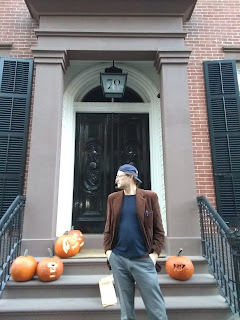









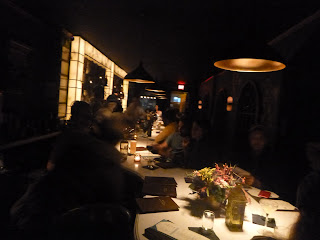










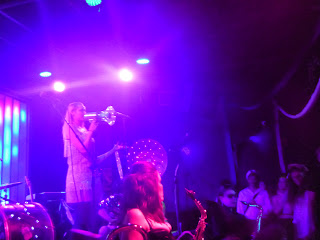





































































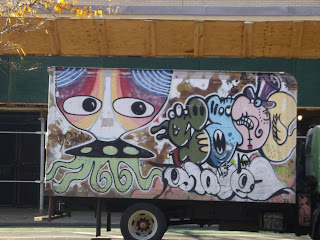







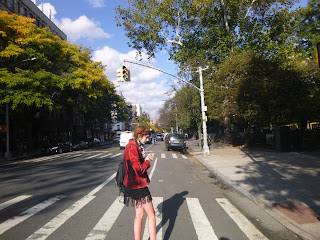







































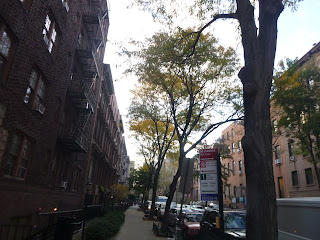































































No comments:
Post a Comment